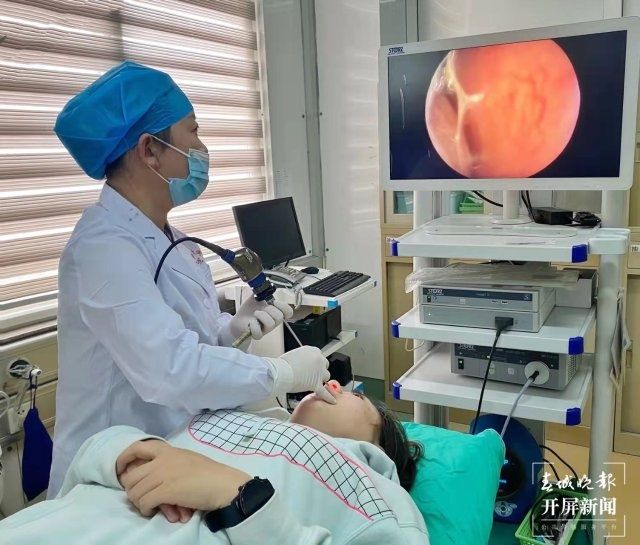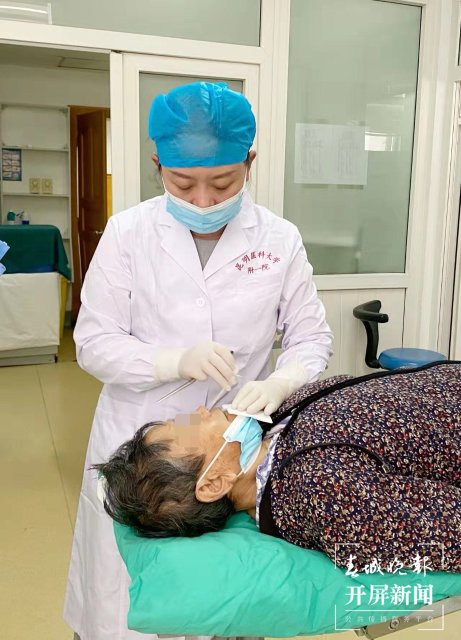April 9th is the 20th National Nose Love Day. The theme of this year’s Nose Love Day is “Caring for Children’s Nasal Cavities and Protecting Airway Health”. Yang Yanli, deputy chief physician of the First Affiliated Hospital of Kunming Medical University (hereinafter referred to as “First Affiliated Hospital of Kunming Medical University”), also said that children’s noses are relatively fragile, and more attention should be paid to children’s nasal health.

Recently, Lingling, who was in the third grade, started rubbing her nose and sneezing again. It was clear mucus, mixed with bloodshots, and it didn’t get better for several days in a row, and at night, my nose was blocked so I couldn’t sleep. Lingling’s mother hurriedly took him to the First Department of Otolaryngology, First Affiliated Hospital of Kunming Medical University to find Dr. Yang Yanli. After careful consultation and examination by Director Yang, it was found that the front of the nasal cavity was blocked by dry blood scabs. After cleaning, the nasal cavity was found. Local mucosal ulceration, the turbinate mucosa was highly edematous, and the blood routine was completely normal. Director Yang considered that Lingling was allergic rhinitis combined with local bleeding of the nasal mucosa. One week after the use of drugs for the treatment of allergic rhinitis and promoting mucosal healing , Lingling’s symptoms were quickly controlled.
Yang Yanli, deputy chief physician, said that epistaxis is the most common emergency disease in the ENT department. It is both a symptom and a diagnosis. For children, allergic rhinitis is the most common, because children’s nasal mucosa is delicate, and the mucosa is highly edematous during allergies. Rubbing the nose or sneezing can cause mucosal damage, which is particularly prone to bleeding. The secretions of sinusitis can accumulate in the nasal cavity and nasal vestibule, causing discomfort such as itching and dry pain. Because children do not blow their noses, they often pick their noses with their hands, resulting in epistaxis. Children are naturally restless, often caused by falls and bumps. Nose bleeding; accidentally stuffing toys, food, etc. into the nasal cavity can also cause damage to the nasal mucosa; in addition, fever often leads to drying of the nasal mucosa and microvessel rupture and bleeding; dry climate or environmental pollution, nose picking often leads to nasal vestibule erosion. Mucosal erosion and oozing blood; nasopharyngeal fibrovascular tumors, blood diseases, liver function damage, nutritional disorders, etc. are rare causes of epistaxis.

In view of the characteristics of these children with epistaxis, the comprehensive principles of etiological prevention, local treatment, and family health education are adopted. In addition to the treatment of nasal inflammation and local hemostasis, the protection of the nasal mucosa is especially important for children. Clinically, for children with epistaxis, the first step is to use normal saline or isotonic seawater to clean and moisten the nasal cavity, and then use gel or peppermint oil to moisten the nasal mucosa to promote mucosal repair.

“Health education is of great significance in the prevention and treatment of epistaxis in children, and proper nasal care can greatly reduce the risk of nasal discharge. Inflammation and damage of mucous membranes.” Yang Yanli pointed out that parents first need to correct their children’s bad habits such as picking their noses, rubbing their noses, and stuffing foreign objects into the nasal cavity, and ensure a balanced diet. In the season of high allergies or in dry air, cold, pollution, etc., daily practice Nasal irrigation is a simple, safe and effective method. Younger children can use nasal saline or seawater spray, and older children who can cooperate with the irrigation can use appropriate household equipment for nasal saline irrigation. The correct steps are: 1. Slightly lower your head at a 45-degree angle, open your mouth slightly, and do not use your nose to inhale or speak during rinsing, so as not to cause aspiration 0.9% sodium chloride must not be arbitrarily adjusted to avoid irreversible ciliary damage. 3. Daily rinse care, usually 1-2 times a day, 5 to 10 minutes each time, it is recommended to rinse the nasal cavity with saline every morning and before going to bed, which can improve nasal symptoms and sleep quality.
Spring City Evening News – Kaiping News reporter Zhang Xiaocheng